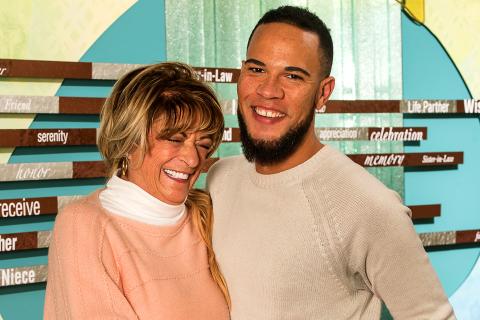
As a graduate student in his mid-20s, Ryan made a decision to help his mother. He donated a kidney on her behalf so she could get a transplant through a process called paired kidney donation.
Paired donation involves two pairs of people, each a donor and a patient who are not a compatible match for one another, but are a match with someone in the other pair.
While noble by any measure, Ryan deflects any gallantry by saying, “Selfishly, I just wanted to keep my mom alive.”
“She was there for me,” recalls Ryan, who was adopted at birth. “I wanted to help her to make the most out of her life.”
Within a year of her kidney disease diagnosis, his mother’s health deteriorated rapidly. By the time she was put on the transplant waiting list, she had just 10% of kidney function. Her doctors thought putting her on kidney dialysis could have doomed her at that point.
“So everyone in my family got tested” to see if they could be a living kidney donor. “No one was a match,” Ryan says, who then learned about paired kidney donation.
“I learned about it, and it was like, ok, this is what we are going to do,” Ryan recalls.
After an intricate matching-and-pairing system through the National Kidney Registry, Ryan donated one of his kidneys to a woman also in desperate need of a new kidney. He was a match for her. Then, through the matching program, someone else donated a kidney to Ryan’s mother.
“I will never forget the day I was allowed to leave my hospital room and see my mom” after she received a new kidney, says Ryan. “It’s still really emotional.”
As a gay Black man, Ryan emphasizes the importance of clarifying misconceptions about organ donation eligibility, stressing that individuals are eligible regardless of their partners or identity.
Ryan aims to dispel myths surrounding organ donation eligibility, reminding people that the restrictions around who can and cannot donate blood do not apply to organ donation.
Ryan also emphasized the reality that many people from racially marginalized communities may fear or have trust issues with the medical system. "But the most important thing to remember is that this is an informed decision that you are choosing to make. And that choice has real power."
“I consider myself to be a storyteller, and part of my story is being a living kidney donor,” he says.
“I’m glad I got to try to help my mom feel healthy,” he says, adding “she instilled a lot in me about the person I am, and it was never about repaying her in any way. The experience of giving a literal part of myself and knowing it wasn’t going directly to her but to another person so that she could live, I think that interconnectedness of it all was very powerful for me.”
Ryan’s recovery from donation surgery was a smooth one. His mother lived an additional 6.5 years. “Ten years out, I feel great,” Ryan says. “Even though I lost my mom, I would 1,000% do it again. I have no regrets about doing it.”
You can extend life to someone you love through living donation. Learn more about living organ donation.